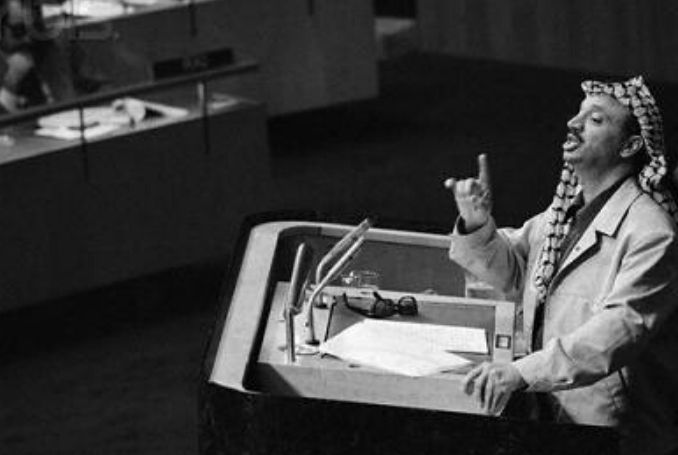The Infallible Warrior: Honest Reflections on the Legacy of Yasser Arafat 15 Years after his Death

Late Palestinian leader and PLO Chairman, Yasser Arafat speaking at the UN General Assembly in 1974. (Photo: UN, file)
By Ramzy Baroud
15 years after the passing of Palestinian leader Yasser Arafat, the Palestinian people continue to reflect on his legacy. Thousands of images of “Abu Ammar” have been shared across numerous social media platforms remembering a man whose nom de guerre has been affiliated with the Palestinian struggle for decades.
Arafat’s legacy, however, is a contentious subject. The deep sense of loyalty that many Palestinians feel towards him is admirable but also worrying. This creates a dilemma: how is one to honestly dissect the history of a man whose status, among many Palestinians, has been elevated to that of an infallible warrior?
Considering that this current Palestinian generation is suffering the consequences of a checkered past – one that was partly moulded by Arafat himself – examining Abu Ammar’s successes and failures is more critical than ever before.
One can honestly say that it was Arafat and his generation of Palestinian leaders and intellectuals who helped resurrect the Palestinian national identity after the humiliating Arab defeat by Israel in the June 1967 war. Prior to that date, the Palestine Liberation Organization (PLO) was neither truly Palestinian nor a genuinely revolutionary force.
Moreover, Arafat, throughout the 1960s and 70s used the party he founded, Fatah, and the PLO to establish a large array of global alliances throughout the Southern hemisphere. This made the image of Arafat, adorned with his black and white Palestinian keffiyeh, a recognizable brand from Chile to South Africa, and from Iran to China.
But Arafat is also responsible for many of the ailments that continue to plague Palestinian society and hamper the Palestinian cause until this day. In fact, much of the widespread corruption, failures and absence of democratically run institutions in Palestine are rooted in the very system of political patronage created by the late Palestinian leader.
From the onset, back in the mid-1960s, Arafat and a small clique of Fatah members tried to dominate the PLO and by extension, all Palestinian national and political institutions, including the Palestine National Council (PNC) and the PLO’s Executive Committee. The former served as a Palestinian parliament in exile and the latter became the executive branch of a government-like structure. While Arafat assigned to himself most of the top positions, his allies were strategically allocated in all branches of Palestinian political life.
Under Arafat, the PLO operated according to the most minimal standards of democracy. Throughout his political career, whether in exile or following his return to Gaza in 1994, he labored to appear politically inclusive. In reality, Arafat shrewdly managed all Palestinian political affairs without any margins for meaningful dissent. Under immense American and Israeli pressure, Arafat and his Palestinian Authority cracked down on all Palestinian political parties that rejected the PA’s subservience to Israel and its “peace at all costs” approach.
Unlike the current leader of the PA and PLO, Mahmoud Abbas, Arafat, at least, was genuine in his desire to establish Palestinian political unity. However the unity he envisaged seemed to imply a united Palestinian front behind him and the political agenda of his choosing.
Palestinians continue to suffer the consequences of this misconstrued notion of ‘unity’, agreeing to a singular political agenda, as opposed to uniting within a single democratic political institution. Arafat could neither achieve the former nor secure the latter.
The shortcomings in Arafat’s legacy became even more amplified after his death. With no true democratic institutions that would permit Palestinians to sort out their many differences, Abbas, Arafat’s heir to the PA/PLO throne, used his position to accumulate wealth, prop up his cronies, and insist on his complete dominance over all Palestinian affairs.
On numerous occasions, Arafat dared to challenge Israel. His besiegement in his office in Ramallah for years, prior to his death from a “mysterious blood disorder” was a testimony to Israel’s loathing of the Palestinian leader. However, it was the skewed political structure that Arafat created that emboldened the aging Abbas in his drive for political supremacy. Indeed, Abbas has single-handedly squandered all Palestinian national achievements, including the PLO itself as a unifying Palestinian political platform.
15 years later, it has become clear that the lack of a meaningful Palestinian political dialogue under Arafat led to the weakening, fragility, and systematic dissolution of the Palestinian national project. If Arafat had allowed for the development of a healthy Palestinian democracy, the Oslo agreement would have never been signed in the first place. Thanks to Oslo, Palestinians are now as trapped in a political maze of unfulfilled agreements and broken promises as they are also imprisoned behind Israeli walls, fences and checkpoints. While the vast majority of Palestinians continue to reel under this horrific Oslo-induced reality, Abbas, the Fatah, and PA elites enjoy the perks of their acquiescence and outright betrayal of the Palestinian people.
Arafat, despite all of his political miscalculations, is still missed in Palestine 15 years following his death. This truth is a commentary on today’s sad state of affairs. What’s most ironic however, is that today’s tragic reality is, in many ways, the direct outcome of Arafat’s own legacy.
– Dr. Ramzy Baroud is a journalist, author and editor of The Palestine Chronicle. His last book is The Last Earth: A Palestinian Story (Pluto Press, London) and his forthcoming book is These Chains Will Be Broken: Palestinian Stories of Struggle and Defiance in Israeli Prisons (Clarity Press, Atlanta). Baroud is a Non-resident Senior Research Fellow at the Center for Islam and Global Affairs (CIGA), Istanbul Zaim University (IZU). His website is www.ramzybaroud.net.










































0 Comments